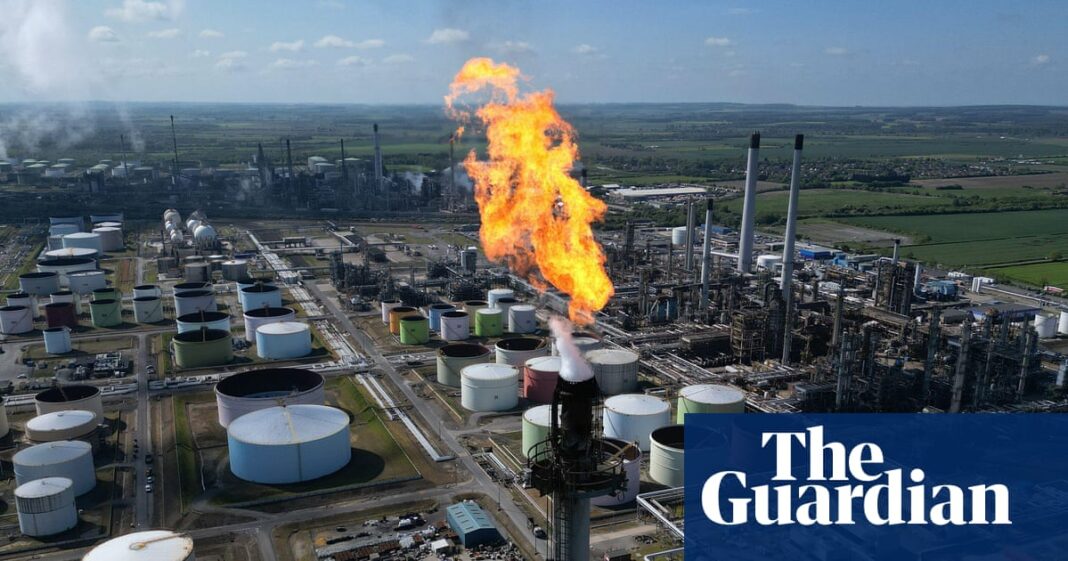The Prax Lindsey oil refinery collapsed after “material irregularities” were discovered in a complex £783m loan facility that funded the wider group, it has emerged.
The refinery on the Humber estuary in northern England – one of just five left in the UK, – was suddenly plunged into administration in late June, prompting calls from furious government ministers for an investigation into Winston Soosaipillai, Prax Group’s oil tycoon owner.
Amid uncertainty about the whereabouts of Soosaipillai, who goes by his middle names, Sanjeev Kumar, administrators sifting through the rubble of the refinery’s parent company, State Oil, published a progress report on Wednesday.
Among details disclosed by Teneo, which is serving as the administrator for State Oil and five other group companies, is a £70m debt owed to HM Revenue and Customs by the group entity Prax Petroleum. Including sums owed by the refinery unit itself, which is being liquidated separately, taxpayers are thought to be owed up to £250m by the wider Prax Group.
Alongside a list of hundreds of creditors, ranging from the oil company Shell to the ride-hailing app Uber and the pest control firm Rentokil, Teneo also offered new insight into the circumstances leading to the collapse of an oil empire that has been described by insiders as a “house of cards”.
According to the Companies House filing, the failure hinged on unspecified “irregularities” relating to the £783m loan, arranged by HSBC in 2021 and secured against expected future income from the sale of oil products, such as petrol and jet fuel.
This facility provided cash for “critical” payments as they came due, such as supplier invoices.
State Oil was the guarantor of this securitisation facility, provided by an Ireland-based entity called Prax Global Financial Services, which stood outside the Prax Group.
Teneo said the refinery, whose revenue generation was critical to the group, was already in a poor financial position in June 2025; the administrator blamed frequent maintenance shutdowns and poor refining margins since Prax bought the plant from the French oil company Total in 2021.
The group was exploring ways to raise new funds when “material irregularities” were discovered and reported to State Oil’s board, it said.
Teneo did not offer further details, such as who had identified the irregularities or what they were.
Directors of the company, including Soosaipillai, decided that the £783m loan facility should “cease” with immediate effect. This meant that guarantees provided by State Oil to other parts of the group for debt financing were also called into question.
The filings show that there are more than £1.5bn of inter-company loans outstanding between entities being administered by Teneo.
The cessation of the loan facility meant that the refinery could no longer repay its major supplier, the global commodities trading company Glencore.
In response, under the terms of its supply agreement with Prax, Glencore seized control of crude oil and refined products, which meant that sales to customers – such as at petrol stations and airports – could not take place without the approval of Glencore.
This, Teneo said, contributed to the “accelerated nature” of the company’s collapse, which blindsided government ministers, who claimed that just weeks earlier Soosaipillai has assured them of the company’ health.
There was less than a week between the discovery of the irregularities and the appointment of administrators, the filings show.
after newsletter promotion
In its 112-page update, Teneo described as “uncertain” the amount that could be recovered for creditors and said it was not yet clear how much they would claim.
It said there were “a number of outstanding matters that may significantly impact the final outcome for creditors”.
Shell is owed more than £10m; HMRC is owed £70m; and Deloitte, which led a 2023 turnaround plan called Project King, is owed more than £700,000.
As well as large corporate creditors, 171 employees of State Oil are owed a combined £4.2m, according to the filings. Of those, 45 have been made redundant.
Teneo said it was trying to sell some of Prax Group’s assets, which include a North Sea oilfield, three tankers and hundreds of petrol stations. It placed the value of State Oil’s shareholdings in subsidiary companies at £112.2m.
The administrator has also filed a legal claim for breach of fiduciary duty against Soosaipillai and said it would file a report into the businessman’s conduct, to be provided to the government’s insolvency service.
Soosaipillai and his wife, Arani, who between them jointly owned the Prax Group, took £11.5m out of the business in pay and dividends after buying the refinery from Total, the Guardian reported this year.
The energy minister, Michael Shanks, has since urged the couple to “do the decent thing” by paying support workers who have lost their jobs within State Oil, which employed 171 people, and in the wider group, which employed more than 600. Soosaipillai has not previously returned requests for comment directed to a former press representative.
Government officials are understood to have had difficulty contacting Soosaipillai. Sources said he is believed to have left the country following the collapse of his oil empire. It was based in Weybridge, Surrey, and he and Arani built it up from a single petrol station over nearly three decades through rapid, debt-fuelled acquisitions.
The Official Receiver, an independent government employee managing the liquidation of the refinery, said it could find a buyer for the refinery, which has ceased production.



